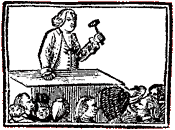The Third Mobbing of Jesse Saville
After the attack on Jesse Saville’s house on 7 Sept 1768, the Essex County authorities brought charges against eight men for assault, as Joseph E. Garland described in Guns Off Gloucester.
The criminal case came to trial in the summer of 1769. The jury acquitted one defendant, Paul Dudley Sargent, and convicted the seven others. The wealthiest, including merchant Joseph Foster and Dr. Samuel Rogers, were fined £10 to £15 and ordered to post £50 bonds for good behavior. Four working men were fined £5 and ordered to post £20 bonds.
The organizer of the mob, David Plumer, was never criminally charged with assault, but he lost his cargo and ship to the Customs Office for smuggling.
That didn’t completely satisfy Saville, however. He pursued another avenue of redress—personal damages. He sued all seven convicted men plus a neighbor named Thomas Griffin.
That case came to court in Newburyport in September. This jury decided that Saville—now a Customs officer himself—had gotten all the satisfaction he deserved. They found the defendants not liable and ordered him to pay court costs.
Saville appealed that verdict, and the case was scheduled for a higher court at the end of March 1770.
Meanwhile, the Boston Massacre occurred in Boston. It’s not clear whether that had any effect on the mood in Essex County, but it might have made people more angry about the royal authorities or (after the army regiments were withdrawn to Castle William) more bold about confronting those authorities.
The result was the third and most violent attack on Jesse Saville, as described with minimal sympathy in the 26 March Boston Gazette:
TOMORROW: The legal fallout.
The criminal case came to trial in the summer of 1769. The jury acquitted one defendant, Paul Dudley Sargent, and convicted the seven others. The wealthiest, including merchant Joseph Foster and Dr. Samuel Rogers, were fined £10 to £15 and ordered to post £50 bonds for good behavior. Four working men were fined £5 and ordered to post £20 bonds.
The organizer of the mob, David Plumer, was never criminally charged with assault, but he lost his cargo and ship to the Customs Office for smuggling.
That didn’t completely satisfy Saville, however. He pursued another avenue of redress—personal damages. He sued all seven convicted men plus a neighbor named Thomas Griffin.
That case came to court in Newburyport in September. This jury decided that Saville—now a Customs officer himself—had gotten all the satisfaction he deserved. They found the defendants not liable and ordered him to pay court costs.
Saville appealed that verdict, and the case was scheduled for a higher court at the end of March 1770.
Meanwhile, the Boston Massacre occurred in Boston. It’s not clear whether that had any effect on the mood in Essex County, but it might have made people more angry about the royal authorities or (after the army regiments were withdrawn to Castle William) more bold about confronting those authorities.
The result was the third and most violent attack on Jesse Saville, as described with minimal sympathy in the 26 March Boston Gazette:
We hear from Cape-Ann, that on Friday night last [March 23], a number of People there, who knew that Town had sustained great Damage by the Misdoings of one Jesse Savil an informer, and that he deserved Chastisement therefor, went in a Body to his House for that purpose, about 10 o’Clock, and finding him in Bed, took him from thence, and walk’d him barefoot about 4 Miles to the Harbour, then placed him in a Cart they had provided for that Purpose, and putting a Lanthorn with a lighted Candle in his Hand, that every one might see him, they carted him thro’ all their Streets, and stopping at every House they roused the inhabitants, and obliged him to declare and publish unto them that he was Jesse Savil the Informer; and having gone round in this manner, they then bestowed a handsome Coat of Tar upon him, and placed him upon the Town-Pump, caused him to swear that he would never more inform against any Person in that or any other Town, and then dismissed him, after having received his thanks for the gentle Discipline they had administered to him.A report in the 13 Nov 1770 Essex Gazette recounted the same event with slightly different details:
…seizing the Person of one Jesse Saville, in the Month of March last, taking him out of his Chamber, in the Night, without Shoes, and almost naked, dragging him over Hills, Dales and Fences, some Times by the Hair of his Head, for about 4 Miles, and then carting him through the Streets of Gloucester. It is said further, that after elevating Saville upon a Pump, and insisting on his swearing not to steal any more Leather, nor to prosecute any Person for thus abusing him, he was tarr’d and dismissed.Another detail, possibly in the court record but first published in James R. Pringle’s 1892 History of the Town and City of Gloucester, said the mob came for Saville “disguised as Indians and negroes.”
TOMORROW: The legal fallout.


